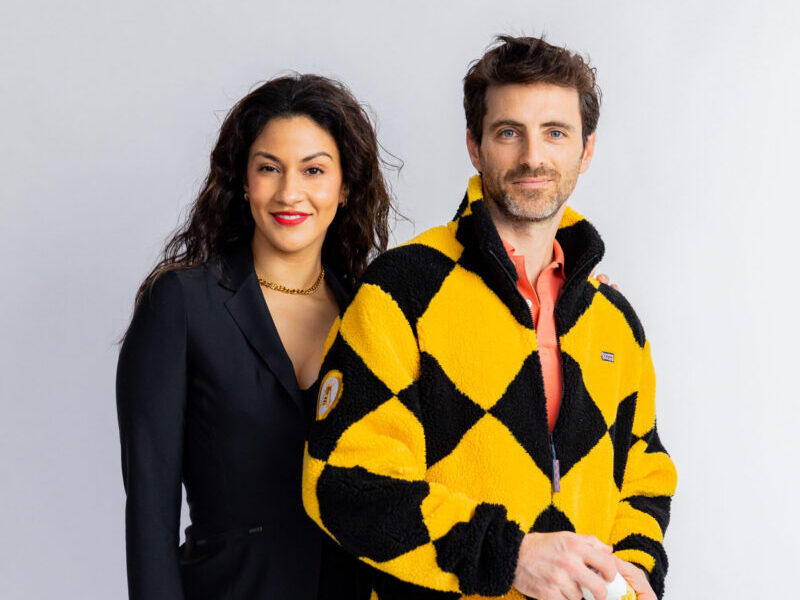

As a beekeeper, I firmly believe there isn’t much in life that can’t be made better by adding a touch of honey, so I was delighted to learn recently that my feelings are shared by Amanda Victoria and Joey Mintz, the couple behind Siponey Spritz Co.
Launched in 2020, Siponey features just four ingredients — and one of them is wildflower honey sourced from hives in upstate New York.
Mintz developed a love for nature as a child, splitting his time between Manhattan and Eastport, where his parents still live. He loved his days on the East End, where he learned to surf, went to camp at Quogue Wildlife Refuge and grew a vegetable garden. His first job after college was on a clam boat in Peconic Bay, an experience he credits with giving him “the biggest Popeye muscles of my life!”
He has since traveled multiple career paths. He worked at a surf camp in Far Rockaway, spent three years as a general contractor in Nicaragua, led rollouts for startups including Citibike in Manhattan, and acted in movies, TV and theater. Under “special skills,” his resume notes rock-climbing, pinball and the ability to grow a beard in a week.
But one experience that has stayed with him more deeply than most was a stint studying horticultural science at the New York Botanical Garden. In addition to learning about the planting, propagation and maintenance of a plethora of greenery, he said, “I learned about bees — how important they are to living, to eating, to our surviving. If there are no bees, there are no pomegranates, no apples, there’s no x, y and z.”
In 2018, a chance meeting on the beach in Westhampton with Amanda Victoria set Mintz on a trajectory that once again brings that interest in bees to the forefront.
Victoria was working at the time as a consultant for some of the liquor industry’s biggest players, like Lillet, Bacardi and the Scotch Malt Whisky Society. Prior to that she worked in the top echelons of the New York bar scene.
“I’ve been in the liquor business since 2005, and I’ve worked for some of the most-awarded bars in the world — bars that were moving forward with making more craft-quality cocktails. In the early aughts we were using fresh juice in cocktails, which was very innovative at the time.
“As a consultant, I had a chance to work on the fun side. It allowed me to travel the world and teach about innovation and quality and how spirits are made,” she said.
Those adventures gave her a discerning palate and an appreciation for fresh, natural ingredients.
Mintz said he thought Victoria’s experience and passion for quality cocktails made her a natural to develop her own brand. Victoria, who knew the challenges of launching a liquor product firsthand, was less sure, but two things convinced her.
It was 2019, and canned cocktails had taken the portable drink market by storm. Everywhere she turned, someone was popping one open. And there was nothing in the smell or taste of those drinks that appealed to her.
“Nobody knew what they were drinking,” she said. “There were a lot of misconceptions about what was going into the can. People thought they were drinking a vodka soda, but it couldn’t be further from the truth. It’s essentially a stripped-down beer, a malt-based byproduct, and then synthetic flavor is added back to that. And you’re getting weird aftertastes when you drink it, you’re getting a weird headache, almost an immediate hangover. It’s because it’s just all synthetic, not real ingredients, and all those things could not be further from what my passion was, which was using better ingredients, and teaching people the story behind those beautiful ingredients.”
Together, the pair came up with a finely tuned cocktail that celebrated their passions, which included offering the public a healthier alternative to traditional cocktails. “So many people I used to work with passed away very early,” Victoria said. “I wanted to be able to stay in the business, but keep health at the forefront of my personal life. One thing I found was that by substituting honey for the simple sugar syrup used in classic cocktail recipes, I found myself feeling better the next day.”
She’s not the first to make that observation. Honey has been touted in many cultures as a way to ease the hangover that can come from overindulging, and a 2015 National Institutes of Health study found that honey reduced the blood alcohol concentration in mice that were given intoxicating levels of ethanol.
With all that in mind, Victoria and Mintz developed Siponey, which contains just five ingredients — aged rye whiskey, fresh lemon juice, wildflower honey, sea salt and sparkling water. The whiskey and honey are both sourced from upstate New York.
“Sourcing the wildflower honey from New York State is important to us,” Mintz said. “We went through a long process of vetting various wildflower honeys to see what worked best for our recipe, and we talked to farm owners about their production process. Right now we’re sourcing all our honey from Kutik’s Everything Bees in Oxford, New York.”
The product was launched in 2020, in the height of COVID, in a “direct-to-consumer” model, but as businesses began opening back up, Mintz and Victoria moved to make the product available in liquor stores as well.
Siponey checks off a lot of “firsts” in the canned drink realm.
“We were the first to put an aged spirit into a can, the first to use all real ingredients, and the first to use a rye whiskey,” Mintz said. “We’re also the first canned spirit company to earn a B Corp Certification,” a distinction Siponey shares with Tom’s of Maine and Patagonia. B Corp Certification confirms a company’s commitment to social and environmental welfare.
In addition to celebrating honeybees through their use of honey as an ingredient, Mintz and Victoria have committed to donating 2 percent of revenues to environmental causes that support honeybees.
“We want to encourage new people to get into having honeybees, putting bee colonies in their backyards. One of the groups we partner with is Detroit Hives, which brings underprivileged youth into making their own honeybee farms, growing their own honeybee colonies,” Mintz said. “By the end of this year we hope to be able to send out a starter honeybee hive for people who are interested.”
Asked if they’ve ever considered becoming beekeepers themselves, Mintz said, “Absolutely!” For now, though, with a new business and a toddler to raise, their hands are pretty full. “I always use native pollinating plants in my garden. We consider ourselves the experts in drink making, and we’re using our business to support people who are experts in honeybees.”
 More Posts from Lisa Daffy
More Posts from Lisa Daffy